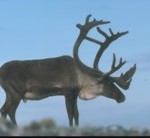 ANCHORAGE, Alaska — The howling has stopped. An animal-rights group is dropping the "howl-ins" it conducted as part of a nationwide campaign to stop the killing of wolves in Alaska, but members will continue their call for a tourism boycott of the state.
ANCHORAGE, Alaska — The howling has stopped. An animal-rights group is dropping the "howl-ins" it conducted as part of a nationwide campaign to stop the killing of wolves in Alaska, but members will continue their call for a tourism boycott of the state. Over the past two years, Friends of Animals helped stage hundreds of demonstrations in cities across the country to protest Alaska's predator-control program, intended to allow moose and caribou to increase in numbers. Some activists dressed in wolf outfits at the gatherings, and some howled in imitation of wolves to protest the hunts.
But the campaign failed to convince Alaska Gov. Frank Murkowski that killing wolves is wrong, said Priscilla Feral, president of Friends of Animals, based in Darien, Conn.
"If the boycott was designed to get Murkowski to sacrifice an attitude, it didn't happen," Feral said.
The animal-rights group had better success about a decade ago, when then-Gov. Wally Hickel stopped a wolf-hunting program after 53 howl-ins in 51 cities.
State biologists estimate that Alaska has 7,000 to 11,000 wolves. They say that's enough carnivores to drive down the number of moose and caribou that many residents rely on for food.
Murkowski remains a strong supporter of the program, said his spokesman, Mike Chambers.
"This has always been a responsible predator-control program that is intended to manage our game populations and it is working," he said. "We are happy that Friends of Animals realizes that feeding people is more important than protecting animals that are not threatened in the first place."
The wolf-control program started in 2003. More than 400 wolves have been killed under the program so far, and the state has set a goal of 400 more this winter, when snow makes the animals stand out. The state issued more than 100 new permits this month to hunt wolves on the ground and from the air.
From December 2003 through April of this year, Friends of Animals held 233 howl-ins across the nation.
But the campaign had little impact on Alaska tourism, according to Dave Worrell, spokesman for the Alaska Travel Industry Association, a trade organization of about 1,000 Alaska businesses. In fact, the number of summer tourists rose from 1.3 million in 2002 to an estimated 1.5 million this past summer, he said.
Friends of Animals will continue its call for a tourism boycott with ads on television and in print, Feral said. Ads have already appeared in publications including The New York Times, Good Housekeeping, National Geographic, and Oprah Winfrey and Martha Stewart magazines.
Feral said Friends of Animal also is fighting the wolf program in court. This past week, the group asked a judge to expedite a ruling on its latest challenge, which questions the state's scientific evidence to support the program.
Matt Robus, director of the state Division of Wildlife Conservation, said state laws require management strategies when crucial moose and caribou herds decline below certain levels.
"We are not casually going out and deciding to do this," he said. "One of the important uses under Alaska history is taking animals for feeding families, for the meat, for the food."



